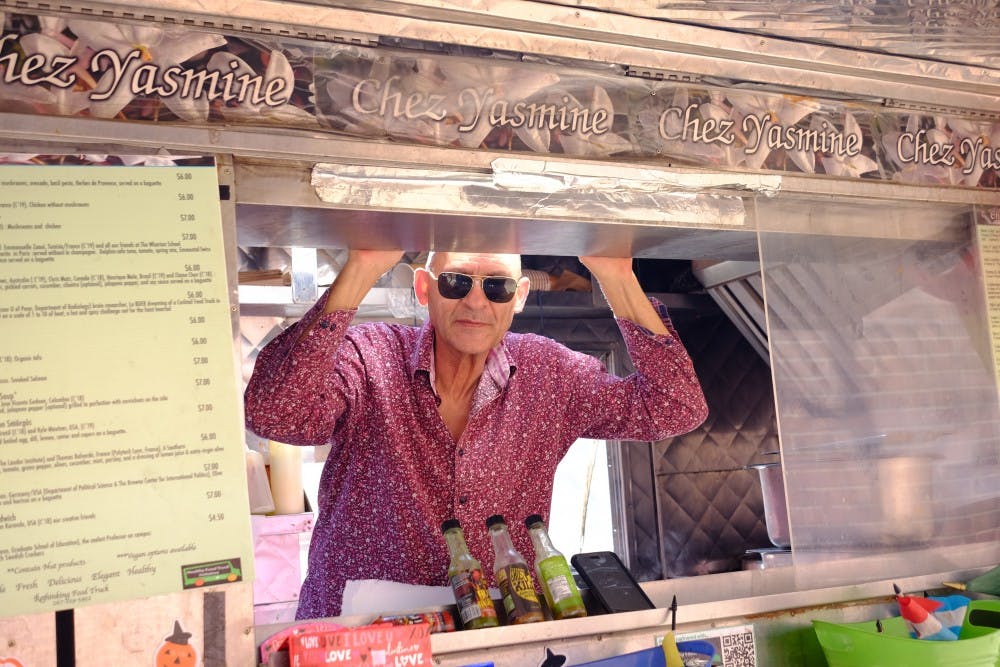Herbes de Provence from Southeast France, black olive paste from San Remo, Italy, extra virgin olive oil from Nabeul, Tunisia, smoked salmon from Sweden, and bottles of exquisite spices are just a few of the ingredients used at Chez Yasmine, the food truck on 37th and Spruce streets. The man behind the truck and their famous sandwich is Jihed Chehimi.
I first visited Chez Yasmine on a Monday afternoon. Jihed and his collaborator, Karim, were busying making grab–and–go food for busy Penn customers. As I waited, I noticed Jihed could easily call out the names of regulars as well as their usual orders.
“Hey, you again! Extra spicy right?” Frequent customers at Chez Yasmine are experts at customizing their meals—asking for “a squeeze of lemon on the sandwich,” “extra spice in the soup,” or “tofu instead of chicken.”
Armed with a pair of aviator sunglasses, Jihed doesn't resemble the stereotypical food truck owner. The story of Chez Yasmine mirrors that of Jihed's life. Born in Tunisia, he received a PhD in Immunology and Infectious Disease in Paris, worked in Sweden, and taught in Vietnam. Jihed’s experience of living in different countries influences the diversity of his menu. Dishes offered at Chez Yasmine fuse elements of traditional Tunisian, Swedish, Vietnamese, and French cooking.
Jihed was not a chef before he opened the food truck. In fact, he's a former research scientist at The Wistar Institute who conducted research on HIV and Hepatitis C. It was his interest in health that inspired his decision to start Chez Yasmine.
“One day, I was walking by the food trucks on Spruce street," he said, "and the smell of the food there gave me headache.” He says food seasonings such as MSG (monosodium glutamate) are often used in these food trucks without any regulations. He wanted to open his own to offer healthy options. He said, "You can cure disease through food.”
Chez Yasmine is a member of the Healthy Food Truck Initiative. Founded by a Penn student, this special distinction is one that almost 99% of the food trucks here at Penn do not have.
Taieb Cherif, a graduate student, adjunct professor of Near Asian Languages and Civilizations, and a frequent Chez Yasmine customer, told me that many French–speaking students frequent the truck. Taieb is from Tunisia and came to Penn through a Fulbright Fellowship, and he finds traces of home in the food and company Jihed provides.
Both the distinct flavors and the health benefits of the food can be attributed to the high quality of the ingredients used at Chez Yasmine. Jihed sources his food from distributors or hand–picked farms while most of the spices are imported from his homeland, Tunisia. He has an special preference for extra virgin olive oil which is a healthier alternative to butter or vegetable oil. Every day after he closes and sanitizes the food truck, he goes to purchase the ingredients for the next day so that they are always fresh.
While Chez Yasmine only opens from 11 a.m. to 2 p.m. on weekdays, earning profits is not Jihed’s priority. It’s more important for him to connect with the students and to promote a healthy food philosophy. All of the dishes are named after certain students or University mainstays, such as "The Wistar."
Customer engagement and guest chefs are two other important features of Chez Yasmine. Jihed has been posting pictures of students smiling in front of the food truck on Facebook in an effort called "Humans of Chez Yasmine.” Jihed's friends and regulars are also sometimes invited to be the one–day guest chefs, either learning how to wrap sandwiches or making the delicious couscous.
Although it takes Jihed seven hours to purchase all of the ingredients needed for a single sandwich, it usually takes Chez Yasmine's customers less than five minutes to get their food. But with one taste of a salmon Smörgås or a piece of Tunisian Tajine, it is clear that the meticulous selection of ingredients and spices is a product of Jihed’s years of experiences and relationships.

